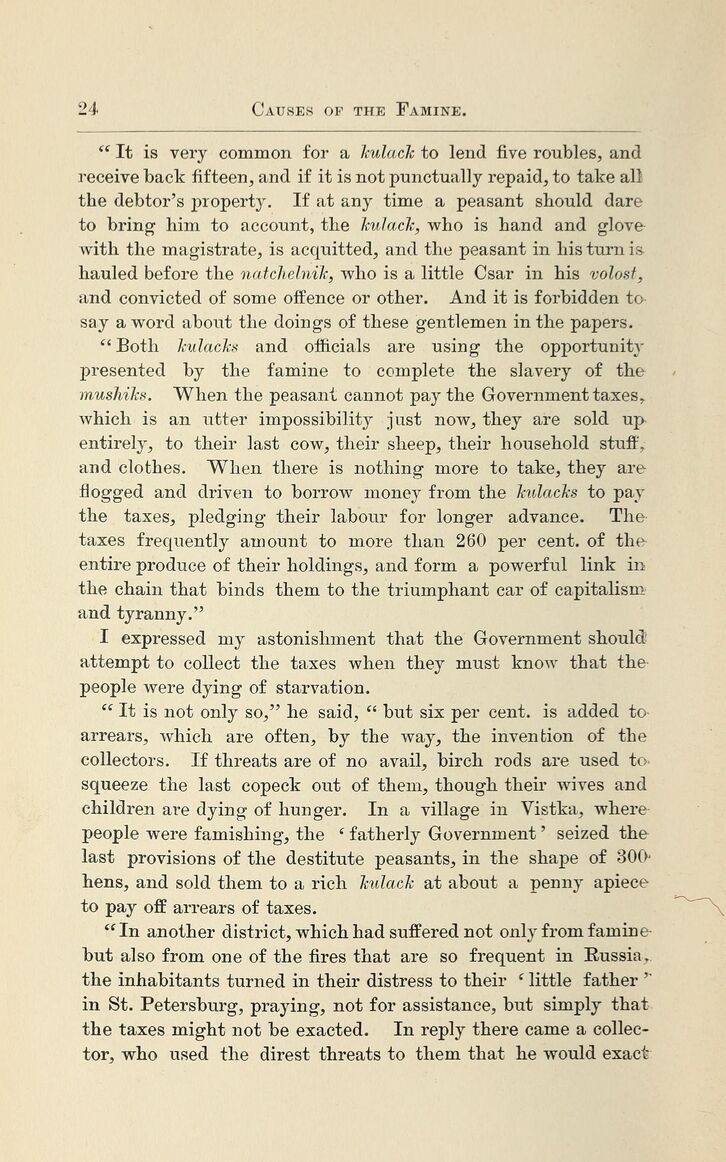
Full resolution (JPEG) - On this page / på denna sida - II. Causes of the Famine

<< prev. page << föreg. sida << >> nästa sida >> next page >>
Below is the raw OCR text
from the above scanned image.
Do you see an error? Proofread the page now!
Här nedan syns maskintolkade texten från faksimilbilden ovan.
Ser du något fel? Korrekturläs sidan nu!
This page has been proofread at least once.
(diff)
(history)
Denna sida har korrekturlästs minst en gång.
(skillnad)
(historik)
“It is very common for a kulack to lend five roubles, and
receive back fifteen, and if it is not punctually repaid, to take all
the debtor’s property. If at any time a peasant should dare
to bring him to account, the kulack, who is hand and glove
with the magistrate, is acquitted, and the peasant in his turn is
hauled before the natchelnik, who is a little Csar in his volost,
and convicted of some offence or other. And it is forbidden to
say a word about the doings of these gentlemen in the papers.
“Both kulack and officials are using the opportunity
presented by the famine to complete the slavery of the
mushiks. When the peasant cannot pay the Government taxes,
which is an utter impossibility just now, they are sold up
entirely, to their last cow, their sheep, their household stuff,
and clothes. When there is nothing more to take, they are
flogged and driven to borrow money from the kulack to pay
the taxes, pledging their labour for longer advance. The
taxes frequently amount to more than 260 per cent. of the
entire produce of their holdings, and form a powerful link in
the chain that binds them to the triumphant car of capitalism
and tyranny.”
I expressed my astonishment that the Government should
attempt to collect the taxes when they must know that the
people were dying of starvation.
“It is not only so,” he said, “but six per cent. is added to
arrears, which are often, by the way, the invention of the
collectors. If threats are of no avail, birch rods are used to
squeeze the last copeck out of them, though their wives and
children are dying of hunger. In a village in Vistka, where
people were famishing, the ‘fatherly Government’ seized the
last provisions of the destitute peasants, in the shape of 300
hens, and sold them to a rich kulack at about a penny apiece
to pay off arrears of taxes.
“In another district, which had suffered not only from famine
but also from one of the fires that are so frequent in Russia,
the inhabitants turned in their distress to their ‘little father’
in St. Petersburg, praying, not for assistance, but simply that
the taxes might not be exacted. In reply there came a collector,
who used the direst threats to them that he would exact
<< prev. page << föreg. sida << >> nästa sida >> next page >>